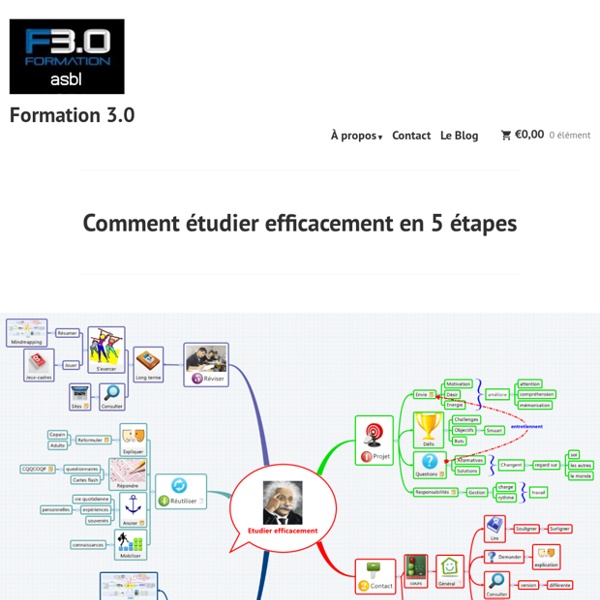



https://format30.com/2012/03/13/comment-etudier-efficacement-en-5-etapes/
Related: Apprendre à apprendre • prof_m_roig • Métacognition • TBIThe Secret to Student Success? Teach Them How to Learn. Sometimes the details former students recall from class is nothing short of amazing. A few years ago I had a student named Abby in my history class, who had always been in self-contained special education classrooms. Her teacher wanted her in my class for socialization purposes, and she did well. A year later, Abby began stopping by my class to deliver notes from the office a few times a week and I was always delighted to see her. One day I had been planning to discuss metacognition—a learning strategy I teach to my middle-school students. Abby walked in just in time to hear me ask the class, “What is one of my favorite big words that begins with ‘M?’”
The Power (and Peril) of Praising Your Kids What do we make of a boy like Thomas? Thomas (his middle name) is a fifth-grader at the highly competitive P.S. 334, the Anderson School on West 84th. Slim as they get, Thomas recently had his long sandy-blond hair cut short to look like the new James Bond (he took a photo of Daniel Craig to the barber). Unlike Bond, he prefers a uniform of cargo pants and a T-shirt emblazoned with a photo of one of his heroes: Frank Zappa. Thomas hangs out with five friends from the Anderson School. HYPERACTIVIT et TROUBLES des APPRENTISSAGES Download Policy: Content on the Website is provided to you AS IS for your information and personal use only and may not be sold or licensed nor shared on other sites. SlideServe reserves the right to change this policy at anytime. While downloading, If for some reason you are not able to download a presentation, the publisher may have deleted the file from their server. 1.
77 Ways to Learn Faster, Deeper, and Better If someone granted you one wish, what do you imagine you would want out of life that you haven’t gotten yet? For many people, it would be self-improvement and knowledge. Newcounter knowledge is the backbone of society’s progress. Great thinkers such as Leonardo da Vinci, Thomas Edison, Benjamin Franklin, Albert Einstein, and others’ quests for knowledge have led society to many of the marvels we enjoy today. Your quest for knowledge doesn’t have to be as Earth-changing as Einstein’s, but it can be an important part of your life, leading to a new job, better pay, a new hobby, or simply knowledge for knowledge’s sake — whatever is important to you as an end goal. Life-changing knowledge does typically require advanced learning techniques.
Publications — LRN Allaire-Duquette, G., Belanger, M., Grabner, R. H., Koschutnig, K., & Masson, S. (2019). Individual differences in science competence among students are associated with ventrolateral prefrontal cortex activation. Journal of Neuroscience Research, 97(9), 1163-1178. doi:10.1002/jnr.24435 ABSTRACT: Functional neuroimaging studies have revealed that, compared with novices, science experts show increased activation in dorsolateral and ventrolateral prefrontal brain areas associated with inhibitory control mechanisms when providing scientifically valid responses in tasks related to electricity and mechanics. Our Growth Mindset Please forgive me if you have already heard me refer to the concept of “growth mindset,” a notion we owe to the renowned Stanford psychologist Carol Dweck, whose book, Mindset: The New Psychology of Success, is one of the most thought-provoking texts about human psychology to have been published in a long time. For Dweck, much of how people approach the challenges they face in life, as well as the way in which they define their sense of satisfaction in meeting those challenges, hinges on the outlook they have on the world. NB. If you do not have the chance to read her book in full, I would highly recommend an article describing her work that was published in New York Magazine a few years ago, entitled “How Not to Talk to Your Kids” ( or this brief interview on YouTube.
Data, Information, Knowledge Many bloggers have discussed the difference of “data”, “information”, and “knowledge”. Here is my attempt. (1) To become knowledge, information must be linked into a context. Simple Ways to Integrate Four Evidence-Based Teaching Strategies When educators understand the science behind teaching practices they can more readily incorporate them into their daily instruction, says Cult of Pedagogy’s Jennifer Gonzalez. In her podcast and accompanying post, Gonzalez highlights the four key teaching strategies researcher that Pooja Agarwal and K–12 teacher Patrice Bain feature in their new book, Powerful Teaching: Unleash the Science of Learning. They explain the science behind the suggestions, many of which are familiar, as well as best practices and applications for each one. Retrieval practice: The goal is for students to recall information from memory and reinforce learning through quick daily assessments.
Learning is optimized when we fail 15% of the time Summary: Learning is optimized in computer models when there is an error rate of 15%. Researchers say the 85% accuracy rule may also apply to humans for optimal perceptual learning. Source: University of Arizona To learn new things, we must sometimes fail. But what’s the right amount of failure? New research led by the University of Arizona proposes a mathematical answer to that question.
This also keeps him adaptable to changing situations. So when he was laid off from his construction management job in 2015, instead of fretting over how to cover the next mortgage payment, he travelled and worked in New Zealand for a year. Renting didn't just free up his capital, it freed up his life. Real Estate is an Exciting and Rewarding Career. However, you have to pass the Real Estate exam by islandhomesbuysell Apr 30